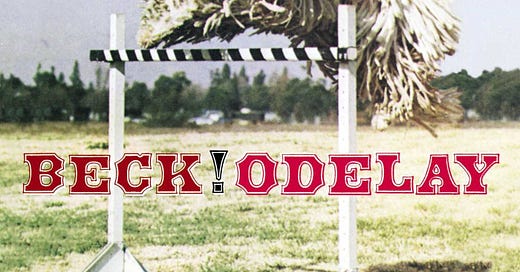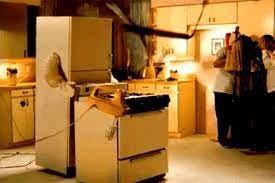Sometimes on The Run Out Grooves, we get a closing track that looks to the future, it paints a possible path forward for an artist, and sometimes they have great success following it. There’s a sense that Beck’s ‘Ramshackle’ at the end of 1996’s Odelay almost does that; it is hard not to hear it as a jumping-off point for later acoustic-based albums Mutations, Sea Change and Morning Phase. We can also see it as a point of continuity with his breakout album, Mellow Gold, that birthed 1994’s slacker anthem, ‘Loser’ and finally, as evidence of a path not travelled on Odelay itself.
Initial recording sessions for Beck’s follow-up to Mellow Gold were also with producers Tom Rothrock and Rob Schnapf. ‘Ramshackle1’ was the only song that made it to the new album, with ‘Brother’ and ‘Feather in Your Cap’ surfacing with 2008’s expanded deluxe edition of Odelay.
Beck told Rolling Stone in 2008
“It was a whole record’s worth of stuff, somewhere between Big Star, Pavement and Nirvana.”
All these have in common not just their acoustic nature but a bareness and downbeat mood that wasn’t replicated on the other material on the album. In many ways, the song also ties back to ‘Blackhole’, the closing track on Mellow Gold. That closes that album in a mellow fashion2. They also talk about down on their luck, homeless individuals, something Beck had been perilously close to in the early 1990s by all accounts, and both feature a member of the Haden family3.
We feel a sense of the type of material that would come along with Beck’s next release, Mutations, shuffling and more earnest acoustic, almost poetic, songs that do not sound like the product of a random word generator as much of the lyrics do on the other Odelay tracks. The impact of The Dust Brothers' production changes the other songs on the album. Aside from ‘Minus’ and ‘Lord Only Knows’, which they didn’t work on, every other track has their signature sound, bringing the layered, hip-hop element they’d brought to their work with The Beastie Boys.4 One could almost argue that Odelay is like a 1990s version of The Clash’s London Calling, though rather than absorbing reggae, rockabilly, ska into punk, it is rap, hip-hop, folk, country, and electro melding with samples and indie rock. Beck did wring out the sponge, and The Dust Brothers took the dead beats from your throat and exploded them.
Ironically, the song itself is the least ramshackle part of the album. Ramshackle is an excellent descriptive term for a lot of what you hear on the album; from the appearance of The Enchanting Wizard of Rhythm to the Echoplex deployed on ‘High 5 (Rock The Catskills)’, we are taken a whirlwind ride only to find ourselves listening to something elegant and in no way confusing or screaming for attention at the end.
Some versions of the album have a hidden track called ‘Computer Rock’ which sounds like washing machines and robots humping - something Beck would explore in 1999 in his 1999 video for ‘Sexx Laws’.
The song was initially called ‘Marty Robbins’ as a tribute to the country singer, and while the song didn’t have much of a history of live performances when it did appear in 1996, it was at country shows and a brief reappearance in 2002
Sorry, not sorry.
The earlier track features Petra on violin, and ‘Ramshackle’ has her father Charlie on bass.






